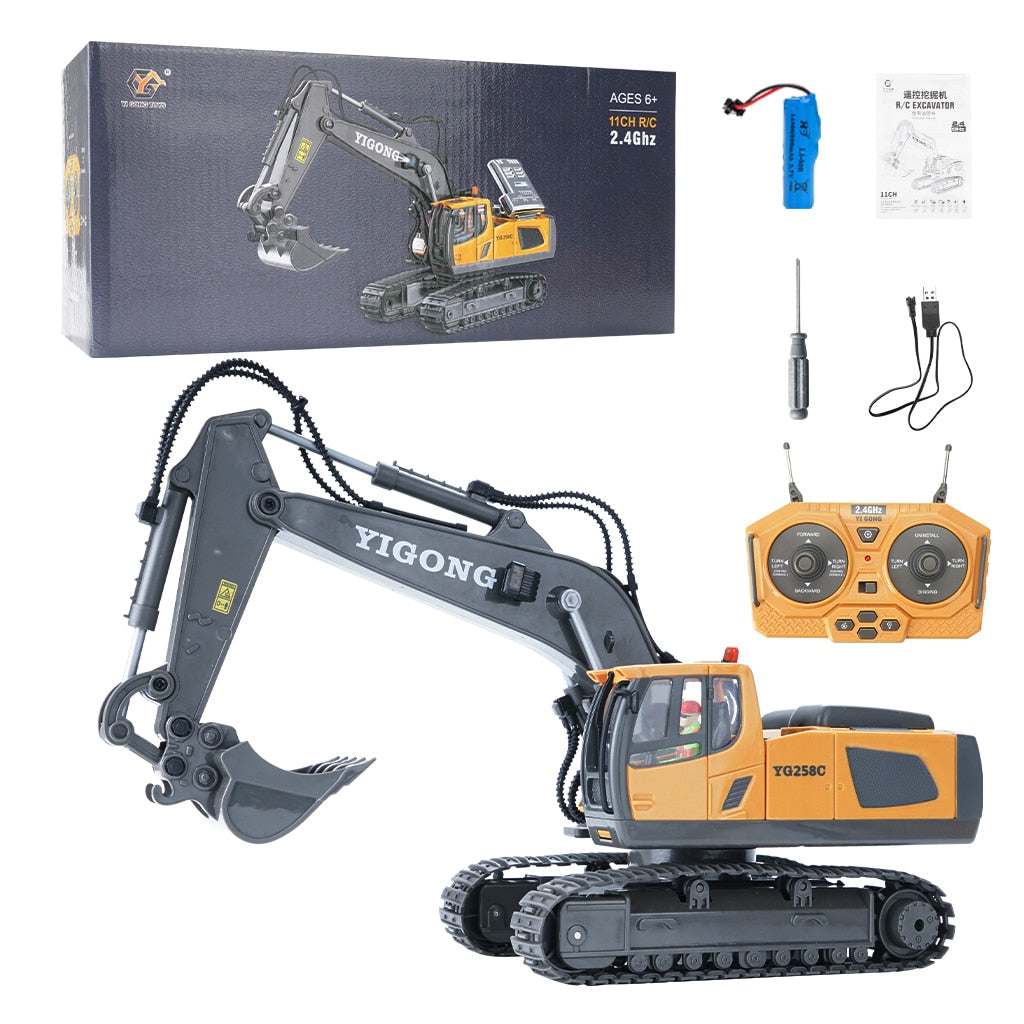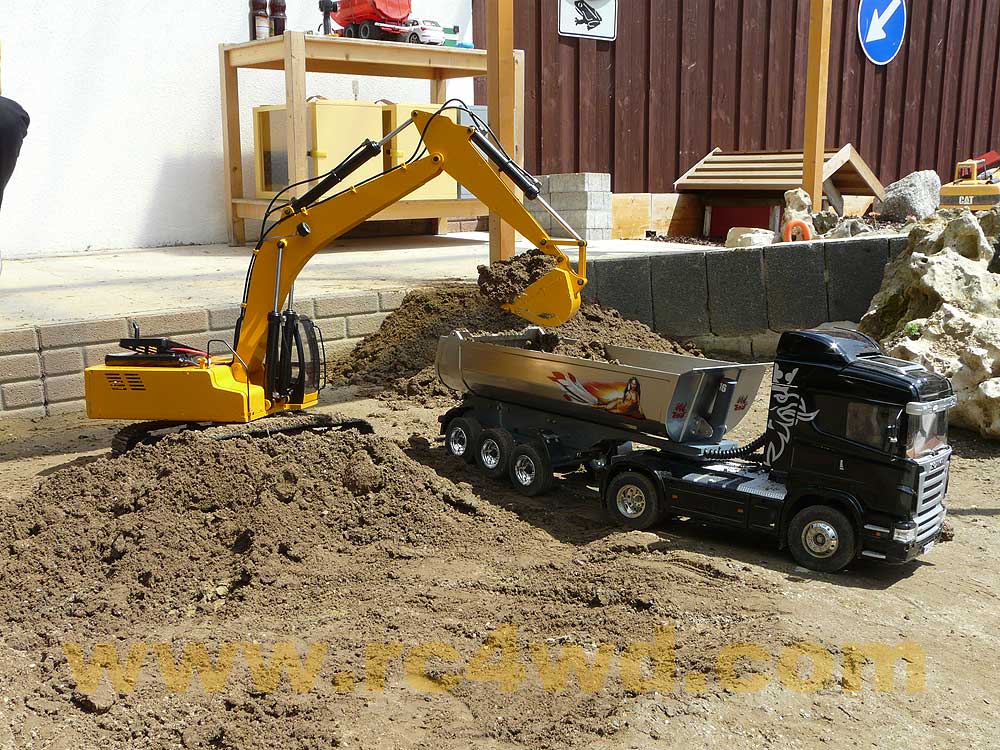Discover the Significance of Excavator in Modern Construction Projects
Excavators are crucial tools in contemporary construction tasks. Their convenience enables them to carry out a vast variety of jobs, from excavating and grading to demolition and site preparation. Advanced functions, such as hydraulic add-ons and GPS, enhance their abilities and performance on work sites. As the industry develops, the relevance of excavators expands a lot more. Comprehending their function can expose insights into the future of building methods. What exists in advance for these machines?
The Flexibility of Excavators in Different Projects
Although excavators are frequently connected with massive building jobs, their convenience allows them to be utilized in a broad variety of applications, from residential landscape design to utility maintenance. In city settings, excavators can browse tight rooms to dig structures for homes or install water drainage systems. Their ability to do delicate jobs makes them optimal for landscaping projects, where they can dig deep into for fish ponds or plant trees. In addition, excavators play an important role in energy maintenance, efficiently excavating trenches for pipes or cable televisions without disrupting bordering locations. In agricultural applications, they aid in land clearing up and soil preparation. Their flexibility enables them to be outfitted with different attachments, boosting their functionality throughout different jobs. This multifaceted nature of excavators not just enhances various building processes but additionally demonstrates their integral function in modern-day infrastructure growth and maintenance.
Secret Features and Kinds Of Excavators
The conversation on crucial functions and kinds of excavators highlights the necessary characteristics that make these equipments vital in construction. Different excavator kinds, each designed for certain jobs, demonstrate their flexibility and performance across different applications. rc excavator. Recognizing these features and classifications is vital for enhancing their usage in modern-day construction tasks
Excavator Types Summary
Excavators play a crucial role in contemporary building and construction, offering adaptability and efficiency throughout different jobs. These heavy machinery devices can be found in a number of kinds, each tailored for certain applications. One of the most usual kinds consist of spider excavators, understood for their security on unequal surface, and rolled excavators, which supply higher mobility on paved surfaces. Mini excavators are preferred for small projects and limited rooms, while long-reach excavators are developed for deep digging. Furthermore, there are customized excavators, such as hydraulic excavators, which improve power and precision. Each type includes special abilities, making them crucial for jobs varying from excavating and grading to demolition and product handling. Comprehending these variations enables building experts to choose the best excavator for their project requires.
Secret Features Explained
Comprehending the essential functions of excavators improves their efficient application in building and construction jobs. Excavators are identified by their powerful hydraulic systems, which provide the required pressure for digging, lifting, and relocating materials. Their verbalized arms permit a vast array of activity, assisting in accurate procedures in confined rooms. Furthermore, the variety of add-ons, such as buckets, grapples, and augers, increases their adaptability to meet different task demands. The size and weight of excavators likewise add to their stability and ability to move on different surfaces. Innovations in technology have actually led to the combination of General practitioner and automation, improving precision and performance in excavation tasks. These functions jointly position excavators as important tools in modern building.
Applications in Construction
Transforming building websites, excavators play a crucial role throughout numerous applications, ranging from household building projects to large infrastructure advancements. These functional devices are outfitted for jobs such as digging structures, trenching for energies, and website grading. Various kinds of excavators, consisting of crawler, wheeled, and mini excavators, supply specific advantages tailored to the job needs. Spider excavators excel in harsh surfaces, while wheeled excavators provide wheelchair on smooth surface areas. Small excavators are excellent for confined rooms, making them preferred in city settings. The effectiveness and power of excavators significantly speed up building processes, making certain prompt job conclusion. Their adaptability additionally enhances their value, enabling building and construction teams to tackle a varied range of difficulties efficiently.
Enhancing Performance and Performance on Work Sites
Maximizing effectiveness and efficiency on work sites is an essential purpose in contemporary construction. Excavators play a crucial function in accomplishing this goal by simplifying numerous jobs. Their capacity to execute several features-- such as grading, excavating, and training-- minimizes the need for added equipment, thus saving time and resources.Moreover, excavators enhance operations by enabling for faster conclusion of projects. With advanced functions like hydraulic add-ons and general practitioners technology, they can execute specific procedures that lessen errors and rework. This accuracy not just boosts the quality of job however additionally maximizes material use, adding to set you back savings.The adaptability of excavators allows them to adapt to different site conditions, guaranteeing that projects proceed efficiently no matter obstacles. By integrating excavators right into building and construction procedures, groups can substantially boost their overall efficiency, leading to prompt task completion and enhanced profitability.
Safety Advantages of Making Use Of Excavators
Excavators substantially improve security on building sites through improved driver presence and decreased hand-operated labor threats. By providing drivers with a clear sight of their surroundings, excavators help to stop mishaps and injuries. Additionally, the equipment reduces the demand for employees to participate in harmful manual jobs, additionally advertising a more secure workplace.
Enhanced Operator Visibility
Building sites can be chaotic and filled up with possible risks, improved operator exposure plays an essential function in making certain security when utilizing excavators. Modern excavators are designed with huge, unhampered home windows and strategically placed mirrors, permitting drivers to keep a clear sight of their surroundings (rc excavator). This enhanced presence is critical for spotting pedestrians, various other machinery, and various obstacles, substantially lowering the threat of mishaps. Furthermore, lots of excavators include sophisticated innovation, such as sensors and video cameras, to give operators with added point of views, further enhancing awareness. The capacity to see even more clearly not only aids in effective procedure but likewise cultivates a much safer workplace, making it simpler for operators to browse complex construction sites without compromising security standards
Reduced Handbook Labor Dangers
When hands-on labor is minimized via the use of excavators, many safety benefits emerge, considerably boosting the wellness of construction employees. Excavators minimize the physical pressure connected with hefty training and repetitive jobs, successfully reducing the threat of bone and joint injuries. By automating processes such as digging, grading, and relocating products, they allow workers to keep a more secure distance from potential risks. Additionally, excavators are equipped with sophisticated safety and security functions, such as rollover protection systems and improved driver ergonomics, which additionally guard employees on site. The result is a considerable decrease in office crashes and injuries, leading to enhanced efficiency and spirits among construction teams. Ultimately, the adoption of excavators contributes to a much safer and much more effective building setting.
Excavators in Earthmoving and Website Preparation
In contemporary building, a considerable part of earthmoving and site prep work jobs depends on the effectiveness and convenience of excavators. These devices are made to handle numerous dirt types and terrain, making them essential for grading, excavating, and trenching activities. Their hydraulic arms can be equipped with various add-ons, such as augers and containers, allowing operators to tailor their technique based on particular project requirements.Excavators succeed at relocating big volumes of planet rapidly and effectively, which accelerates the overall construction timeline. They can browse limited areas and challenging sites where typical tools might battle, enhancing efficiency. Furthermore, the accuracy of excavators assurances that website prep work follows stringent specifications, minimizing the threat of mistakes that might result in pricey rework.
The Role of Excavators in Demolition Tasks
Excavators play a necessary role in demolition tasks, as they have the power and dexterity needed to take down structures effectively. Outfitted with various attachments such as hydraulic breakers, shears, and grapples, these machines can adjust to different demolition demands, whether for tiny buildings or huge industrial websites. Their versatility makes it possible for operators to take on complicated tasks while preserving safety and precision.In addition to their demolition capacities, excavators help with particles removal, making sure that job sites continue to be safe and orderly. By breaking down frameworks right into convenient pieces, they permit streamlined clearing up and recycling of products, aligning with modern sustainability efforts.Moreover, excavators can access tight areas and browse irregular terrain, making them crucial in urban demolition jobs. On the whole, their robust design and multifunctionality make excavators an essential asset in the demolition phase of building and construction, contributing substantially to project timelines and effectiveness.


Future Fads in Excavator Modern Technology and Use
As the construction market evolves, improvements in excavator technology are poised to change their usage and performance markedly. One substantial fad is the integration of automation and artificial intelligence, enabling excavators to run with very little human treatment. This shift will certainly boost accuracy in jobs such as grading and trenching, decreasing human mistake and enhancing productivity.Additionally, the surge of electrical and hybrid excavators is forming an extra lasting building atmosphere, reducing carbon exhausts and gas prices. Enhanced telematics systems are also emerging, allowing real-time tracking of equipment efficiency and upkeep requirements, which can result in far better functional efficiency and longer tools lifespan.Moreover, developments in add-on modern technology are expanding the versatility of excavators, permitting them to perform a more comprehensive series of jobs. The combination of these patterns shows a future where excavators are smarter, greener, and much more versatile, ultimately reshaping building project characteristics.
Frequently Asked Inquiries
How Do Excavators Contrast to Various Other Building Equipment?
Excavators, characterized by their convenience and power, stand out in digging and earthmoving contrasted to other equipment. Their ability to execute various jobs, consisting of training and demolition, makes them important in construction projects, improving general performance.

What Is the Ordinary Life Expectancy of an Excavator?
The ordinary lifespan of an double e volvo rc excavator excavator commonly ranges from 7,000 to 10,000 operating hours, depending on maintenance, use conditions, and design. Correct care can extend this life expectancy, ensuring peak efficiency throughout its operational years.
Exactly How Are Excavators Maintained for Optimum Performance?
Excavators need regular maintenance for peak performance, including routine evaluations, fluid checks, filter substitutes, and timely fixings. Carrying out a preventative upkeep timetable assists lengthen their life expectancy and warranties reliable procedure in different construction settings.
What Are the Costs Related To Renting vs. Acquiring an Excavator?
The expenses connected with leasing versus getting an excavator vary significantly. Renting out offers lower upfront expenses yet can accumulate with time, while buying needs a considerable preliminary financial investment, but offers lasting cost savings and possession ownership advantages.
What Training Is Required to Run an Excavator?
Operating an excavator calls for specialized training, normally including security procedures, maker procedure methods, and ecological understanding. Qualification programs often mandate functional experience, enabling operators to handle numerous jobs effectively while making sure conformity with industry guidelines. The most common kinds consist of spider excavators, understood for their security on uneven surface, and rolled excavators, which offer greater mobility on paved surface areas. Small excavators are favored for small tasks and tight spaces, while long-reach excavators are developed for deep excavating. Additionally, there are specific excavators, such as hydraulic excavators, which enhance power and precision. Different kinds of excavators, including spider, wheeled, and mini excavators, offer details benefits tailored to the job needs. Spider excavators stand out in harsh terrains, while rolled excavators use mobility on paved surface areas.
Comments on “How the remote control excavator Reduces Human Error and Boosts Precision”